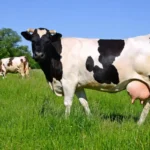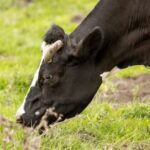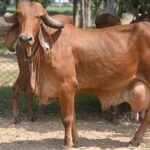Calcium Deficiency in Cows; Why Calcium Supplements are Important

Calcium Deficiency in Cows; Why Calcium Supplements are Important– Calcium of one of the most important minerals that is crucial for cattle. It plays a key role in muscle function and increasing immunity. Calcium is one of the essential minerals to maintain the health and welfare of your cow. If you are a dairy farmer, you have to ensure that cattle are in good health. So, providing minerals is important in optimizing the milk product in cows. Before we look at the factors to keep in mind while choosing the right calcium supplement, let’s explore the importance of calcium deficiency in cows, and why calcium supplements are important.
Table of Contents
ToggleWhat Calcium Do for Cattle?
Calcium is important for skeleton tissue, muscle strength, and nerve function in cows. It keeps their gastrointestinal movement consistent. When cows have a deficiency of calcium, they can pull the calcium stored in the bones. Additionally, calcium plays a key role in muscle operation and the immune system. A deficiency of calcium can cause milk fever and your cow can face clinical diseases. Low blood calcium can affect the muscles of the uterus and rumen. Cows need a large amount of calcium to sufficiently mobilize, due to deficiency cows are not able to stand properly which results in poor health and performance.
Symptoms of Calcium Deficiency in Cows
A calcium deficiency can be seen in cows within 48 hours of calving. However, the calcium deficiency can also develop before calving. The calving proceeds very slow and it can often seen. However, 50% of cows have shown calcium deficiency. A cow has a serious calcium deficiency can be recognized by a low appetite in the cattle. Also, calcium deficiency can cause the skeletal muscle and stop working of bones properly. Other muscles are also affected such as the heart and rumen due to a deficiency of calcium.
There are two common forms of calcium deficiency:
Symptoms of clinical milk fever: a cow that has clinical milk fever shows signs of severe calcium deficiency cows are not able to stand and they feel cold every time.
Symptoms of subclinical milk fever: clinical milk fever affects the cows and they will perform tasks less efficiently as a result of underlying calcium deficiency and are much more likely to convert into diseases. Subclinical milk fever leads to mastitis, uterine infection, endometritis, and placenta retention.
Importance of Calcium Supplement for Cows
Calcium is very important for the overall health of cows. Here, are some key importance calcium supplements:
Bone Health: calcium is very essential for the maintenance of bone and teeth in cattle. Cows require a good amount of calcium to support their skeletal structure and muscles.
Milk Production: cows body have high calcium demand for milk production. A deficiency of calcium affects milk production and lowers the quality of milk.
Prevention of Metabolic Disorders: Calcium plays an important role in preventing metabolic disorders during calving. Milk fever can lead to muscle weakness, decreased feed intake, and even lead to death of cows if not treated early.
Muscle Function: Calcium is important for muscle contraction. Moreover, calcium is very crucial in the birthing process. Unadeaute calcium leads to improper muscle function.
Reproductive Health: Proper calcium levels are important for good reproductive health in cattle. Calcium deficiency also impacts the fertility and overall health of cows.
Nerve Function: Calcium is important for nerve function in cows. The deficiency of calcium can lead to issues related to the nervous system and affects the bones.
How to Important to Choose the Right Calcium Supplement for Cows:
Calcium is a more complex interaction than other minerals. As well known cows face many challenges when calving. As we mentioned it’s common to experience calcium deficiency for cows. Calcium is so important for animal health that it prevents slow calving, weal calving, low minerals difficulty in giving birth to cows, milk fever, and much more. Also, calcium is a major structural component of bone and essential for dietary minerals. Calcium is the most important mineral in the body and plays a key role in the composition of milk. Additionally, it is important for muscle contraction, blood clotting, skeletal tissue, and transmission of nervous tissue.
Blood calcium levels begin to decline around the time of calving, when calcium levels in cows in the second and higher lactations decrease further and reach their lowest levels approximately 12 to 24 hours after calving. The new cutoff for total serum calcium is about 8.5 mg/dL, and levels below this have been associated with many health problems in early lactating cows.
Here are some tips help you to choose the right calcium supplement for cows:
| Take help from a veterinarian | take the help of the veterinarian to determine your cow’s need for calcium supplements and what kind of supplement would suit your needs. |
| Identify the source of calcium | calcium supplements can come from different sources and you can choose a source that you need and is readily available or cost-effective. |
| Quality ingredients | choose supplements that contain high-quality ingredients and have high bioavailability. Focus on the brand and look at the compound and excluding fillers. |
| Brand reputation | purchase high-quality feed supplements for cattle and preferable to a company with a positive record for their product’s safety and efficacy. |
| Cost Effectiveness | it is important to note the relative cost per nutrient unit of different supplements. You should know about the products you are going to pay for. |
Wrapping Up
Calcium is the key mineral for cows, calcium is present in both the blood and bones of a cow. as the increase in the milk yield, there is also an increase in the calcium requirement in the body of the cow. When a cow suddenly needs calcium, she starts using the calcium supply from the blood. Due to this, calcium in the blood is replenished from the bones, kidneys, and intestines. However, this process can take some time and then calcium deficiency can occur in the body.
Pecus Healthcare is one of the top suppliers and dealers of calcium supplements for coes in India. We offer the cost-effective calcium supplements. Moreover, we offer results that have been processed with ingredients of the highest caliber to guarantee their longer shelf life, nutritional value, and adequate composition. So, if you are looking for a quality calcium supplement contact Pecus Healthcare.
Frequently Asked Questions (FAQs) Calcium Deficiency in Cows; Why Calcium Supplements are Important
1) Why calcium is essential for cows?
Calcium is essential for muscle contraction, blood clotting, skeletal tissue, and transmission of nervous tissue impulses. Inadequate calcium balance leads to metabolic diseases and loss of milk.
2) How give supplements to cows?
The calcium should be given with 500 milliliters of 23% calcium gluconate and follow the instructions given on the products. However, the oral calcium bolus is enough for cows.
3) What are the symptoms that indicate low calcium in cattle?
Anorexia, confusion, dey muzzle, and abnormal body temperature are the symptoms that indicate low calcium in cattle.
4) What are common diseases caused by to deficiency of calcium in cattle?
Calcium deficiency that occurs in young cows may lead to rickets, delayed maturity, reduced fertility, lowered milk, unthriftness, fragile bones, and paralytic syndromes.








